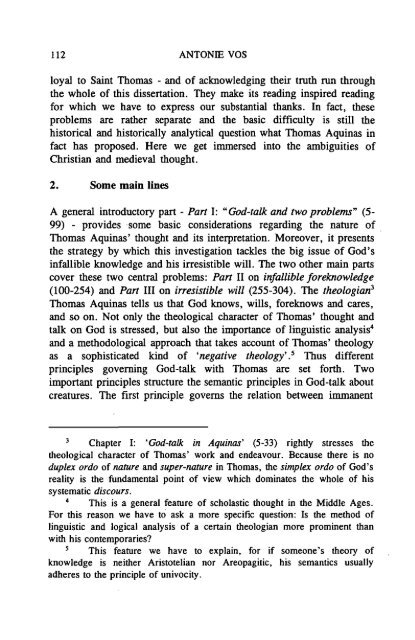Jaarboek Thomas Instituut 1997 - Thomas Instituut te Utrecht
Jaarboek Thomas Instituut 1997 - Thomas Instituut te Utrecht
Jaarboek Thomas Instituut 1997 - Thomas Instituut te Utrecht
Create successful ePaper yourself
Turn your PDF publications into a flip-book with our unique Google optimized e-Paper software.
112 ANTONIE VOS<br />
loyal to Saint <strong>Thomas</strong> - and of acknowledging their truth run through<br />
the whole of this dissertation. They make its reading inspired reading<br />
for which we have to express our substantial thanks. In fact, these<br />
problems are rather separa<strong>te</strong> and the basic difficulty is still the<br />
historical and historically analytical question what <strong>Thomas</strong> Aquinas in<br />
fact has proposed. Here we get immersed into the ambiguities of<br />
Christian and medieval thought.<br />
2. Some main lines<br />
A general introductory part - Part I: "God-talk and two problems" (5-<br />
99) - provides some basic considerations regarding the nature of<br />
<strong>Thomas</strong> Aquinas' thought and its in<strong>te</strong>rpretation. Moreover, it presents<br />
the stra<strong>te</strong>gy by which this investigation tackles the big issue of God's<br />
infallible knowledge and his irresistible will. The two other main parts<br />
cover these two central problems: Part II on infallible foreknowledge<br />
(100-254) and Part III on irresistible will (255-304). The theologian'<br />
<strong>Thomas</strong> Aquinas <strong>te</strong>lls us that God knows, wills, foreknows and cares,<br />
and so on. Not only the theological charac<strong>te</strong>r of <strong>Thomas</strong>' thought and<br />
talk on God is stressed, but also the importance of linguistic analysis"<br />
and a methodological approach that takes account of <strong>Thomas</strong>' theology<br />
as a sophistica<strong>te</strong>d kind of 'negative theology'? Thus different<br />
principles governing God-talk with <strong>Thomas</strong> are set forth. Two<br />
important principles structure the semantic principles in God-talk about<br />
creatures. The first principle governs the relation between immanent<br />
Chap<strong>te</strong>r I: 'God-talk in Aquinas' (5-33) rightly stresses the<br />
theological charac<strong>te</strong>r of <strong>Thomas</strong>' work and endeavour. Because there is no<br />
duplex ordo of nature and super-nature in <strong>Thomas</strong>, the simplex ordo of God's<br />
reality is the fundamental point of view which domina<strong>te</strong>s the whole of his<br />
sys<strong>te</strong>matic discours.<br />
4 This is a general feature of scholastic thought in the Middle Ages.<br />
For this reason we have to ask a more specific question: Is the method of<br />
linguistic and logical analysis of a certain theologian more prominent than<br />
with his con<strong>te</strong>mporaries?<br />
5 This feature we have to explain, for if someone's theory of<br />
knowledge is neither Aristo<strong>te</strong>lian nor Areopagitic, his semantics usually<br />
adheres to the principle of univocity.








